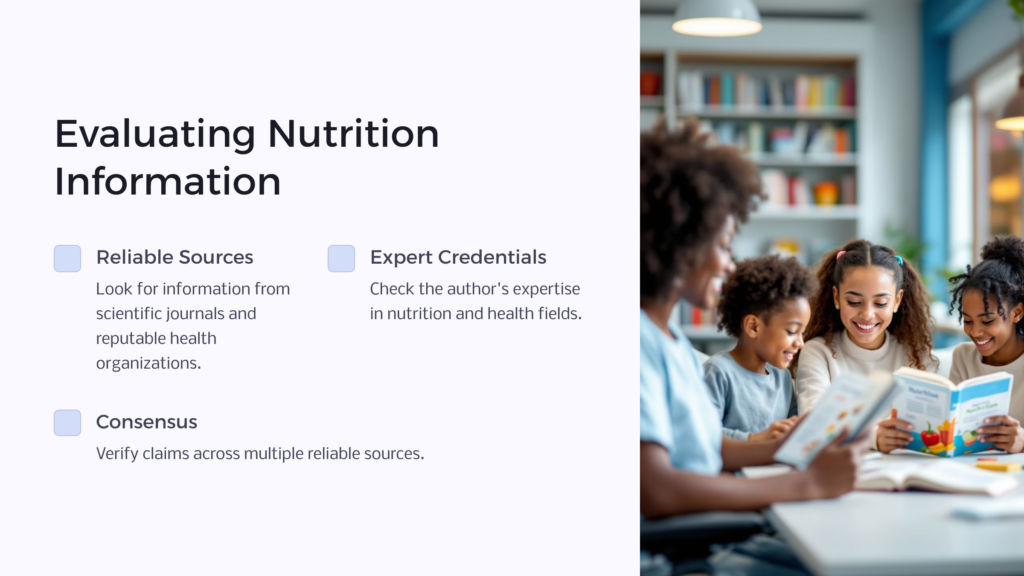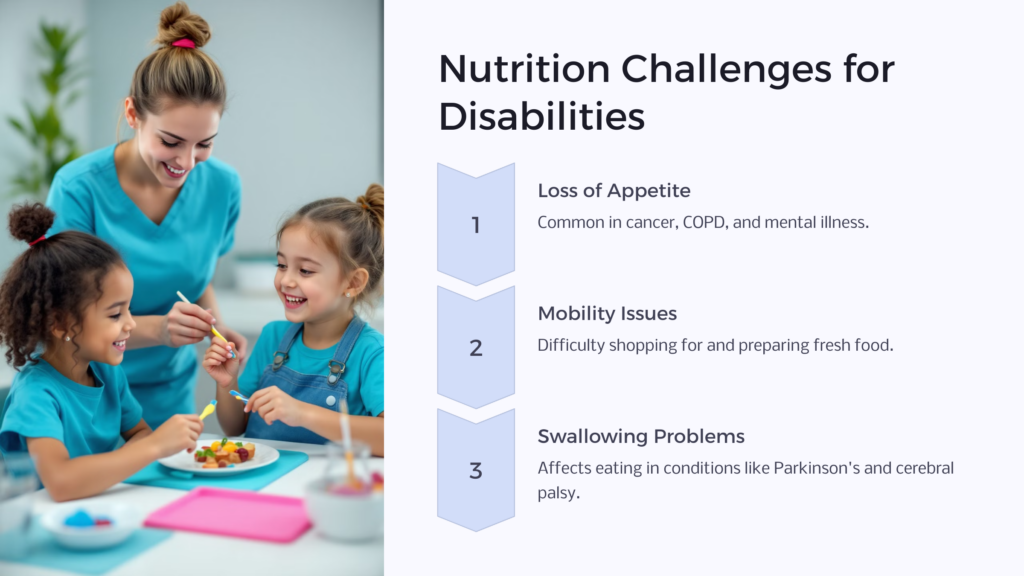Medicine, therapy, treatments, and surgery are all traditional methods to alleviate the physical and mental symptoms of illness, disease, and many disabilities. However, an area that has been overlooked by many as part of the strategy for improvement of health issues for people with disabilities is nutrition. The modern scientific research of nutrition has contributed critical information about the effects of different foods and diet on people’s health. Understanding and applying recent research on diet and nutrition, especially as it relates to health and disability, can be one of the best ways you can improve the quality of your life, prevent additional health issues, and even advance your physical well being.
Two main areas around nutrition that most apply to people with disabilities include interpreting scientific research as it applies to your particular health needs and understanding the financial implications of incorporating improved nutrition into your life. You don’t have to be a scientist or an economist to understand these two areas. You do have to be selective and careful in knowing the value of what you read. But armed with the best information from experts in nutrition and money management you can develop a plan that includes nutrition to improve living with a disability.
The Science of Nutrition

First, let’s look at the information available to you about the science of nutrition. There is no shortage of nutrition information in books, magazines, social media or websites. But are all of these science-based or reliable sources for you to incorporate in making decisions about your health? Unless you have a background in nutrition, access to a comprehensive library of medical and scientific journals and the time to read through and process the research findings, it is almost impossible on your own to tackle the mountain of facts available. And relying on friends, social media, or even traditional media resources to provide you with comprehensive and understandable nutrition news will not necessarily provide the depth or accuracy of information you might need related to your specific conditions. Fortunately, there are many trustworthy sources that review scientific and professional literature readily available on the Internet. Some examples to get you started will be explained in a moment.
Another complication is the time-consuming process of developing a thorough understanding of the effects of nutrition and food science on your body and your particular disability. As you know, disabilities can occur as a result of many different factors including accidents, genetic disorders, childhood through adult diseases, age or other conditions, among many other causes. What a person eats will not be the cure-all for every individual or disabling condition. However, a basic understanding of how to interpret nutrition information as it applies particularly to you can be a powerful tool to improve your overall health. Of course, any changes you make to your diet should be discussed with your doctor and other health professionals who are treating you for your disability.
So where do you begin? First, you need to know how to evaluate information that has been substantiated by scientific research or expertise. Scientific research is usually reported in professional journals, and in the case of nutrition, it is research conducted by nutritionists, dietitians, scientists, physicians, or others with credentials in a field. Many journals are published by universities (particularly those with medical schools or schools of public health) or non-profit organizations that specialize in nutrition science. Some examples include the Journal of Human Nutrition and Food Science, the Journal of Nutrition, Health and Aging, the New England Medical Journal and the American Journal of Preventive Medicine. Experts also may publish reports that include analysis and interpretation of research in popular magazines, newspapers, websites, and blogs. The important element is for you to know whether or not the author of any material has the expertise to review or explain the information.
For example, there are many websites devoted to nutrition information based on scientific research including ones from the Center for Nutrition Studies (nutritionstudies.org), the Physicians Committee for Responsible Medicine (www.pcrm.org/health), NutritionFacts.org, www.eatright.org produced by the Academy of Nutrition and Dietetics, and ScienceDaily.com, plus dozens of blogs about nutrition and health. Again, as an educated reader, always review the credentials of the contributors of the information. If the writers are not professionals in health and nutrition, they can still be experts if they have experience reviewing, analyzing and interpreting scientific research or advanced education in these and related fields. If professional information is not available with the information, you can always Google the writer’s name to learn more about their expertise.
If you are overwhelmed by the amount of information available and determining whether or not it is reliable (and you will be), there is one final rule of thumb to follow: If you read something that is science-based about nutrition, it should be easy to find plenty of additional information from reliable sources in support of or similar to it. If only one source claims that eating clams daily will add years to your life, for example, you can determine that the community of experts does not agree with that claim. Pay attention to the sources of the nutrition information you find and never hesitate to check it out by asking your doctor, dietitian or other nutrition expert. Also, if websites provide contact information, a Q and A section, Ask Questions, or discussion area, you can easily learn more about the sources of information.
Once you understand how to evaluate information, you can refine your search to aspects of nutrition directly related to your disability or your interests. For example, if you have a heart disease-related disability, you can search for nutrition information specifically related to heart health. In addition, there are many scientific studies that have been conducted about nutrition related to cancer treatment and recovery, diabetes, lung and breathing disorders, age-related disabilities and other debilitating diseases. In addition there are reliable resources on nutrition for children with disabilities, including the Vanderbilt Kennedy Center and the Academy of Nutrition and Dietetics.
A technique that may be helpful as you read information is to jot down the websites or sources you think are good ones, or bookmark them to review again. Some people like to print information so that they can re-read it away from their computer. If you keep a notebook or bookmark the articles you are reading it is easier to build a body of knowledge about your specific interests. This technique also allows you to cross check the resources to verify the information and note any questions you have for further investigation. Making nutrition decisions based on information you are reading about and studying in depth can have huge pay-offs in helping you to feel better despite your disabilities.

The benefits of healthy diets to prevent disease and disability along with poor nutrition as a cause of or contributor to disease and disability are well documented in the scientific literature. But there are also disabilities that affect individuals’ malnutrition. People with long-term conditions such as cancer, chronic obstructive pulmonary disease (COPD), liver disease, and mental illness may experience loss of appetite or digestive stress. When nothing sounds appetizing or a person craves only food that has little nutritional value, it can negatively affect the person’s overall health as well as the progression of their disability. People with back injuries or mobility issues find it difficult to get up and fix food for themselves let alone to shop for fresh food to have on hand. Some chronic and developmental conditions, such as Parkinson’s disease and cerebral palsy, make it difficult for individuals to physically chew and swallow food. These considerations are important in planning how to incorporate nutrition information into practical eating situations.
Investing your time to learn about specific foods and their nutritional value or effect can make you an active participant in improving your life with a disability. Share your interest and newfound knowledge about nutrition with your family and friends. The research and information available can be life changing—in a good way! And now let’s tackle another piece of the nutritional puzzle and that is, how can people with disabilities on a fixed income afford to pay for healthy food? Isn’t it much more expensive to pay for high-quality nutrition?
The Cost of Good Nutrition
 It is not surprising that most people have definite beliefs about food and the costs associated with it. Look at some of these statements related to these beliefs and consider what you think of them:
It is not surprising that most people have definite beliefs about food and the costs associated with it. Look at some of these statements related to these beliefs and consider what you think of them:
- Fast food isn’t healthy but it is cheaper and tastier than cooking at home
- Since organic food is more expensive it costs more to eat healthy
- You get what you pay for (you don’t get what you don’t pay for)
- Food that is good for you automatically costs more
- If I had more money I would eat healthier food
- If a food has special health benefits it costs more
If you agree these statements sound reasonable or familiar, then you are like most consumers who believe that the higher the quality of food (nutritious), the more expensive it must be. The relationship between healthy food and high prices is complicated, however, and understanding the cost of nutrition requires thoughtful investigation.
Let’s consider the variety of prices at the grocery store for fruit salad, for example. Buying a fruit salad ready to put on the table with a variety of cut-up fresh fruit would probably be the most expensive option. The middle option might include a selection of one type of in-season fruit, peeled and cut up for salad. The least expensive option might be a couple of cans of fruit salad. The choices here are based on the type and variety of fruit used, the method of packaging or processing, whether the fruit is local or is shipped from someplace else, special sales events and even the season of the year. Many people believe that fresh is always better (both tastes better and is more nutritious) than canned or frozen. However, when you look at the nutritional information about each, barring additives such as sodium or extra sugar to the canned or frozen varieties (and that is very easy to check on the label), there is not a major difference in health benefits. So taste, convenience and price should be considerations in deciding which to purchase for nutritional value.

There is also a lot of confusion about organic versus regular products. Organic is a farming and food processing designation. The organic label has more to do with how food is grown, fertilized, and irrigated rather than about the nutritional value for human consumption. If it is important to you to support organic food production, than realize you are paying more in some cases but not necessarily for better nutrition. Also note that there is a wide range of requirements for food to be labeled organic. Some people claim that organic food tastes better to them. There are research studies that have shown that there are potential benefits to organic food production in slightly higher levels of nutrients, healthier fatty acids, and lower toxic chemical levels. Once you are familiar with various aspects of organic food, you can better make a personal decision about it. As with all food, safety practices in washing, cooking, and even selecting all food must be observed.
Making nutritional and budget decisions about using resources to their maximum benefit are not always simple. Consider what usually drives you in making food selections, such as variety, convenience, calories or value. Do you feel confident that you have sufficient knowledge to purchase and prepare nutritious food within your budget? How will you educate yourself to become a better consumer by maximizing your dollars in buying the best food for you and your family?
It doesn’t have to cost more to improve your nutrition. It does involve taking the time to learn more about both nutritional content and budget decisions related to the food you purchase, prepare and eat. Abundant resources are available on nutrition and stretching your food budget. The time you invest educating yourself about these two factors can provide great returns for your health and well-being. Take the first steps today to get started!
By Jackie Booth, Ph.D.
 Benefits.com Advisors
Benefits.com Advisors
With expertise spanning local, state, and federal benefit programs, our team is dedicated to guiding individuals towards the perfect program tailored to their unique circumstances.
Rise to the top with Peak Benefits!
Join our Peak Benefits Newsletter for the latest news, resources, and offers on all things government benefits.




















